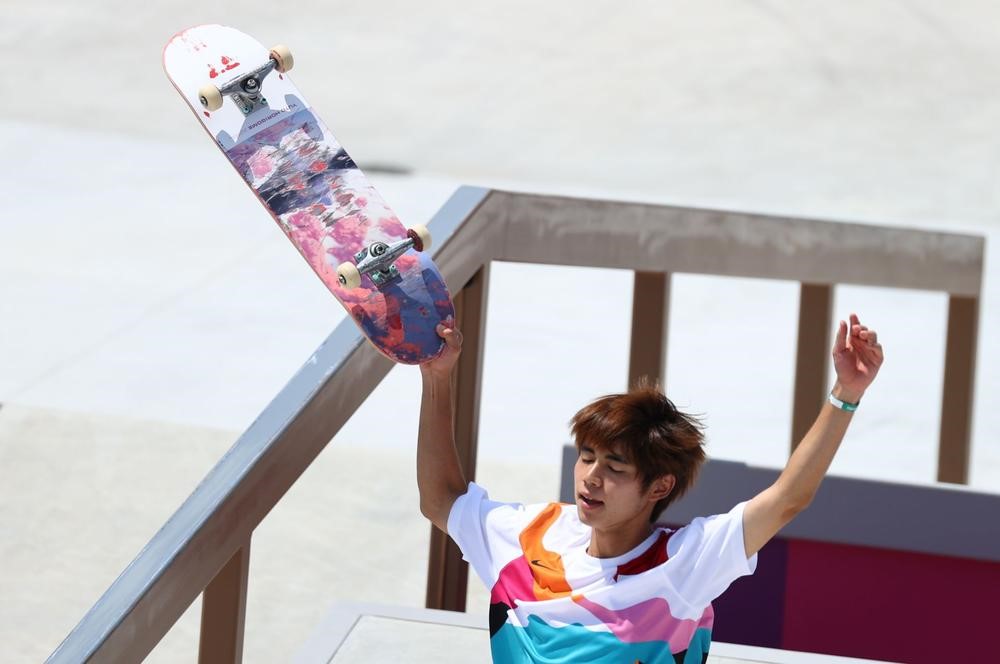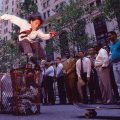For the first time in skateboarding history, skateboarders represented their country at the 2020 Tokyo Olympic Games with a chance to win a gold medal.
This moment was over 5 years in the making, with qualifying contest circuits spanning years of training for these athletes. Many of which are teenagers making their Olympic debut and with the contests having no predictable first place favorite.
As The Olympics catapulted our favorite sport onto the highest competitive stage in the world, countries sent their best skateboarders to compete in Tokyo, Japan, as the first Olympic Skateboarders ever. In an event that changed skateboarding and the world of sports, forever.
That is precisely why we crafted this review, so we can go over the Skateboarding 2020 Tokyo Olympics, and learn everything that made this moment so special and the analysis of the aftermath. Some of which echo the polarizing nature of the Olympic Games.
For a complete guide to the skaters who qualified and the countries they represented, you can check out our Everything You Need To Know About the 2020 Tokyo Olympics.
What we’ll cover in this article recap:
- What was the Skateboarding Tokyo 2020 Olympics competition format?
- Analysis and Recap of All Four Skateboarding Olympic Contests
- Who Were the Stars of the Skateboarding Tokyo 2020 Olympics?
- Reactions from the Skateboarding Community
What was the Skateboarding Tokyo 2020 Olympics Competition Format?

The Tokyo 2020 Olympics took place at the Ariake Urban Sports Park. A skate park lush with handrails, stair sets, A-frames, manny-pads and other urban style obstacles favorable to street skateboarding. The now infamous skatepark will be left standing for local skaters to enjoy for decades and surely produce some of the best skaters out of Japan.
Countries who were fortunate enough to represent an Olympian had two contests: Park and Street divided by Women’s and Men’s heats. As we will see later in this article, each contest was fantastic and made not only skateboarding history, but Olympic history.
The two contest formats would bring 8 skaters out of 20 qualifiers into the final medal rounds.

Street competition: The street competition would hold the same scoring and format as Street League Skateboarding – 3 rounds comprising qualifiers, prelims/semi finals and finals with the top 8 skaters advancing to the final medal round.
The high and lowest scores for each run and jam session are dropped, and the remaining three scores are average to two decimal places.

Park competition: The park competition consisted of 3 rounds: Qualifiers, prelims, semi finals and finals. The first 20 skaters from the combined rankings of the heats progressed to the prelims. Then the 20 skaters competed in 4 heats of 5 skaters, with the top 8 skaters from the combined heat rankings progressing to the finals.
The high and lowest scores for each run are dropped, and the remaining three scores are average to two decimal places.
Judging: The IOC, International’s Olympic Committee commissioned 5 judges to score Olympians on a 0-100.00 point scale. Both of the street and park runs, and each of the 5 street jam session tricks, are judged by the five judges.
As we will see later in this article, there was some confusion and controversy regarding the judging.
Men's Street Skateboarding

For a complete list of the 20 qualifying skateboarders for Men’s Street competition, check out our comprehensive guide to the Skateboarding 2020 Tokyo Olympics.
Here are the list of Olympic skateboarders who qualified for the final medal round and where they placed:
Gold :Yuto Horigome, Japan (37. 18)
Silver: Kelvin Hoefler, Brazil (36.15)
Bronze: Jagger Eaton, USA (35.35)
4th: Vincent Milou, France (34.14)
5th: Angelo Caro Narvaez, Peru (32.87)
6th: Aurélien Giraud, France (34.14)
7th: Nyjah Huston, USA (26.10)
8th: Gustavo Ribeiro, Portugal (15.05)
The Men’s Street competition has always been the crown jewel of any major contest. The Olympics was no exception. That being said, what really made this contest great, was the diversity of the finalists. 6 of the 8 spots were representatives of different countries, with only 2 from USA and France. The heat conditions made the finalists unpredictable and the park obstacles didn’t seem to favor any skater over the other.
While many skaters favored Nyjah Huston to bring home the gold medal, skaters like Angelo Narzaez of Peru made their debut to the skate world. Ultimately, Yuto Horigome of Japan would bring home the gold with his impressive display of technical tricks on the biggest obstacles. The hometown hero held it down!
Women's Street Skateboarding

For a complete list of the 20 qualifying skateboarders for Women’s Street competition, check out our comprehensive guide to the Skateboarding 2020 Tokyo Olympics.
Who Qualified for the final medal round?
Here are the list of Olympic skateboarders who qualified for the final medal round and where they placed:
Gold: Momiji Nishiya, Japan (15.26)
Silver: Rayssa Leal, Brazil (14.64)
Bronze: Funa Nakayama, Japan (14.49)
4th: Alexis Sablone, United States (13.57)
5th: Roos Zwetsloot, Netherlands (11.26)
6th: Zeng Wenhui, China (9.66)
7th: Margielyn Didal, Philippines (7.52)
8th: Aori Nishimura, Japan (6.92)
The Women’s Street contest was arguably the most gnarly contest of them all, with skaters taking heavy slams and grinding down giant handrails. While the scoring produced some controversy, (judging the women on the same physical standard as men) and the announcers seemed to have zero clue what was going on; these amazing women competed in the first ever Olympic women’s street competition with gusto.
Alexis Sablone, the queen of core skateboarding, was by far the most celebrated skater of the group. In her 30s, competing against 13 year olds, the MIT graduate might not have taken a podium spot but she represented the modern skate community. While 2/3 women on the podium were teenagers and nearly all the contestants were under the age of 16, there was nothing childish about the amazing skateboarding. We watched these women prove the future of skateboarding is in good hands.
Men's Park Skateboarding

For a complete list of the 20 qualifying skateboarders for Men’s Park competition, check out our comprehensive guide to the Skateboarding 2020 Tokyo Olympics.
Here are the list of Olympic skateboarders who qualified for the final medal round and where they placed:
Gold: Keegan Palmer, AUS (95.83)
Silver: Pedro Barros, Brazil (86.14)
Bronze: Cory Juneau, USA (84.13)
4th: Luiz Francisco, Brazil (83.14)
5th: Kieran Woolley, AUS (82.04)
6th: Steven Piniero, Puerto Rico (75.17)
7th: Vincent Matheron, France (42.33)
8th: Pedro Quintas (38.47)
Men’s Park skateboarding was dominated by the Australian Keegan Palmer. The young buck scored nearly ten points more than the nearest medal but that doesn’t mean the contest was uncompetitive. Instead, on their last run, some skaters saw their boards fly from under them. But that was understandable as these skaters were competing in 98 degree weather with 80 percent humidity.
You could literally see the sweat drip off their faces and onto their boards. The younger skaters thrived in the unique environment without fans as well, but the summer olympics heatwave wasn’t just from the sun. It was from these amazing Park skateboarders who put everything on the line – flying high and grinding fast.
Women's Park Skateboarding

For a complete list of the 20 qualifying skateboarders for Women’s Park competition, check out our comprehensive guide to the Skateboarding 2020 Tokyo Oympics.
Here are the list of Olympic skateboarders who qualified for the final medal round and where they placed:
Gold: Sakura Yosozumi, Japan (60.09)
Silver: Kokona Hiraki, Japan (59.04)
Bronze: Sky Brown, United Kingdom (56.47)
4th: Misugu Okamoto, Japan (53.58)
5th: Poppy Starr Olsen, AUS (46.04)
6th: Bryce Wettstein, USA (44.50)
7th: Dora Varella, Brazil (40.42)
8th: Yndiara Asp, Brazil (37.34)
Women’s Park was easily the most competitive contest of the entire skateboarding Olympics. With the top 4 finalists being teenagers, they placed within 7 points of each other. That’s a single run or trick difference. As with the Men’s Park contest, the USA struggled to qualify, with Japan and Brazil representing multiple skaters.
It can be difficult to put into words what these contests actually mean for skateboarding as a whole, but what we do know from these amazing young women, thousands of new skateboarders will be inspired to step on a skateboard for the first time. With so many of these rippers being 13-14-16 year olds, the future of women’s skateboarding is going to be making Olympic headlines for years to come. If this is the first of its kind, imagine how great the skating will be at the 5th or 10th skateboarding Olympics – and will your child be one of them?
Who Were the Stars of the Skateboarding Tokyo 2020 Olympics?

Although skateboarding competitions have been around for decades, the Olympics would prove to be nothing like the X-Games with Tony Hawk. Additionally, unlike many of the newer sports to be added to the Olympics, there would be no American favorite from Team USA.
In fact, the Japanese were favored as they were the Olympians most used to skating in their home country weather. They would go on to win 6 of the 12 medals for Olympic Skateboarding.
The Japanese: The Japanese were really the show of the entire Olympic Games, but this was especially true for skateboarding. Taking home 6 of the available 12 medals, including 3 of the 4 Gold Medals, the Japanese proved why their country is producing some of the best skateboarders in the world. Led by Yuto Horigome and the pair of teenagers for the women’s divisions, Japan will have to defend their medals next Olympics and for years to come.
Sky Brown: By now, you’ve hopefully heard of Sky Brown. The 13-year old phenom became the youngest medalist in the history of the United Kingdom (a country several hundred years old) when she took home Bronze in Women’s Park. She is now an instant celebrity and will inspire thousands of young girls to step on a skateboard. Bravo!
Angelo Caro Narvaez of Peru: While in his home country of Peru, Angelo Caro Narvaez is now a legend, for many, the Olympics was our first time witnessing Angelo skate. And not just skate, but making it to the Men’s Street finals, besting seasoned veterans like Puerto Rico’s Manny Santiago and Canada’s Micky Papa. The dark horse, to use a sports term, put himself on the map and became an instant Olympic favorite.
Teenage Women Skateboarders: Simply put, there was an incredible amount of skateboarders under the age of 16, let alone 18. You could see from the sheer amount of helmets as the IOC required any skater under 18 to wear one. Four out of the 8 women in the street final were 16 or younger. In the park competition as well, Funa Nakayam of Japan was 16, Kokona Hiraki of Japan was 12, and Sky Brown of the United Kingdom is just 13. Oh yeah, 15-year old Misugu Okamoto from Japan and the Brazilian Silver Medalist Rayssa Leal is only 13 as well.
Keegan Palmer: Simply put, the Australian Keegan Palmer ran away with the gold medal. Keegan boasted a score of 95.83., whereas the nearest skater was at 86. Nearly a ten point difference! With high powered 540s, heel flip indy grabs six-seven feet over coping, Keegan put on one of the gnarliest and purest displays of park skateboarding we’ve ever seen.
Reaction from the Skateboarding Community

The reaction from the skateboarding community regarding the Olympic Games was off to a rocky start with its announcement in 2016. It has become more polarizing than any other skateboarding events.
While most of the skateboarding world’s elite skaters are congratulating one another for becoming Olympic athletes capable of representing their countries and winning medals, the ‘core’ counter culture of skateboarding condemned the skateboarding Olympics in a myriad of ways.
While most nay-sayers just turned the skateboarding event into a satire, some went all the way, posting tombstones with graphics dating 1960-2020, saying skateboarding is now dead. However, there were some genuine reactions from the skateboarding community worth mentioning.
For the majority of skateboarding, the Olympics were somewhat underwhelming:
Why do you ask? Considering skateboarding culture has been debating the Olympics for nearly half a decade, for all of the commotion, coverage, and controversy to boil down to a few days was not the grand finale many skaters were anticipating. Furthermore, the contests were very familiar.
The contests resembled a Street League Skateboarding 2.0 contest format for street, and a Vans Park Series 2.0 for Park. This was probably the largest let down for skateboarding culture. The contest was not very unique and seemed like something skateboarding had seen before.
This has spurred some skaters to create a rallying cry for a different contest format more in tune with Olympian feats: Highest ollie contest, longest wheelie, grind or slide. Otherwise the contests will not change and generally feature the same type of skating for the coming decades.
It was also largely believed the announcers were poor in their descriptions and coverage of the skating. (Which is not uncommon in skate contests).
Women’s park and street contests were much more compelling than the men’s:
This is largely due to the reason above; the women’s contests felt much more novel, with a more diverse skateboarder pool of teens, legends and contemporary skaters. We had 13-year olds and 33 year olds in the same contest. And with 13-year old Sky Brown taking Bronze, history was made as the youngest Olympian from Great Britain. There was one tragedy however; the judges were scoring the women off the same criteria as the men. So while the men were receiving 7-8-9s for their scores, the women would receive 2-3-4s. This left a poor taste in the skate community’s mouth.
The harsh weather conditions athletes were competing in:
The last point of emphasis worth noting. With the majority of these skaters training for months (even years) many trained in their home towns or countries. Normally, skateboarders are used to traveling constantly but Covid kept them training in the same conditions. Essentially, the Japanese skaters who were more adept to skating in Japanese weather and time zone, had a crucial advantage. This was true across the Olympics in general with temperatures being in the high 90s with the humidity levels anywhere between 70-89%.
That being said, not a single skater is taking anything away from the Japanese, who against tremendous odds not only hosted the Olympics, but represented them at the highest level on the biggest stage. It is more a response to articles like this one from TIME, suggesting Japan is the best nation of skateboarders.
Improve Your Skating
If you sign up for our skate lessons, our certified instructors will be there with open arms to catch you if you fall.
Help you or your loved one gain self confidence and maintain an active healthy lifestyle by contacting GOSKATE.














